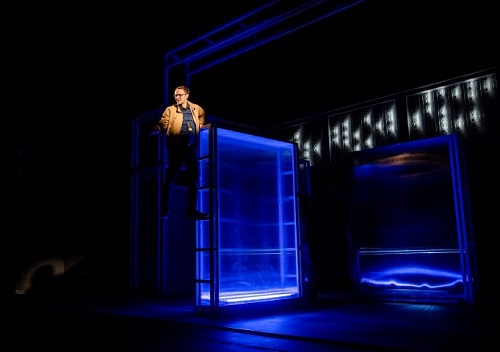The controlling idea of is an emphasis on the necessity of communication – specifically being present, active and engaging with your fellow human being. We are introduced to a handful of everymen and women who serve as the lens for this PSA in talking to one another. Patronising? Perhaps – but more importantly it’s an understandably alluring concept that is too open for its own good. It takes a lot of time for the piece to make its point, and its failure to land its points until the very last line leaves a bitter aftertaste. This two-act play doesn’t feel like a journey entirely worth going on to say what it wants to say.
Whilst the script possesses a very clear understanding of its subject matter and is at times remarkably adept, it isn’t wholly demonstrated until the second act. Or, perhaps more accurately, it isn’t translated entirely until the second act. Co-directors Kathy Burke and Scott Graham do the script an injustice with clunky direction that is meandering and tonally inept. Proxemics are uninteresting, the texture of the overarching narrative is contrived and unengaging and the set is underused to a borderline outrageous degree – allowing for basic, tame interaction that is frustratingly unambitious for a company of Frantic Assembly’s stature and sensibilities. The text has moments of humour but these moments are handled with a real ham-fisted approach – the play is at its worst when it knows it’s funny, and this is too often the case.
Perhaps the greatest injustice of the work is how unlikeable and unknowable the characters are. Maybe the warning signs should’ve been present from the off – the play’s introduction can only be described as a ghastly staple-sitcom opening ambiguously abstracted to the stage; music plays and we are introduced to the characters through a carousel of images depicting them in moments to come. Is this because these moments define them? A fair question that carries an obvious answer which in most cases would appropriately compliment said foreshadowing technique, but the world the characters inhabit is lifeless and they remain vapid within it. Is their trauma who they are? There is no insight into their identity beyond their circumstances and therefore it’s impossible to identify with them until they reach their breaking points and their trauma is explained. Unfortunately, even an entire hour of tedious and static vignettes doesn’t get us any closer to these people. Presenting characters in such vacuous circumstances undermines the message of the piece – it’s devastatingly human, so why are we being denied this? Why are these individuals treated as vehicles and tableaus for us to gawk at? And not complex, interesting individuals who can speak (even by not speaking) beyond their trauma and their trauma?
Despite some antagonising and jarring pieces of performance from the cast that disrupt the nuance of the narrative, there is a sense that most of the cast are capable of more than is presented on stage. When they aren’t shattering the realism of the work with melodramatic, overemphasised and expressive monologues, they do an excellent job of conveying the emotional jeopardy of the silent and grieving. Designers Morgan Large, Paul Keogan and Ella Wahlstrom excel in their respective departments also, with an excellent use of lighting that accentuates its purpose as another theatrical language on stage, an adequately inventive soundscape and a set that, although not utilised to it’s full potential, has a lot to admire.
For a company on the national curriculum, this show ironically seems to embody the professional sensibility of those learning about their work, instead of demonstrating how they set the benchmark.
Reviewer: Louis Thompson
Reviewed: 11th February 2020
North West End UK Rating: ★★


